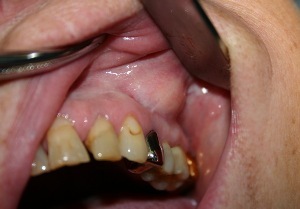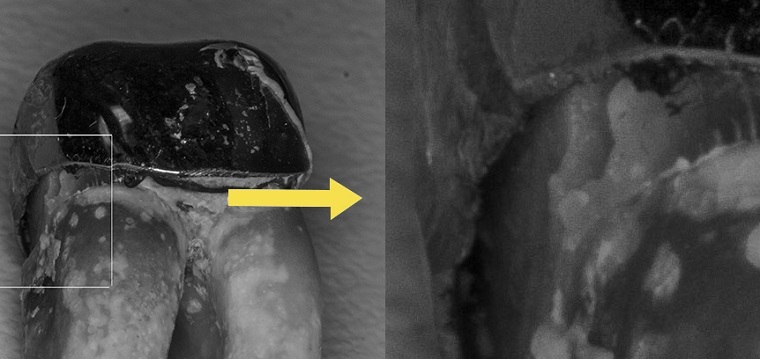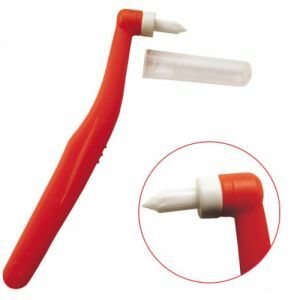 There are cases when after a while after installation of a crown from under it the unpleasant smell begins to be felt. Its appearance can be associated with both the wrong manufacture and installation of the structure itself, and with inflammatory processes in the tooth itself.
There are cases when after a while after installation of a crown from under it the unpleasant smell begins to be felt. Its appearance can be associated with both the wrong manufacture and installation of the structure itself, and with inflammatory processes in the tooth itself.
In any case, the problem can not be resolved without consulting a doctor. If you postpone the visit to the future, not wanting to touch the newly installed crown, then sooner or later the tooth decays and it can be lost.
Contents of
- Why does the tooth smell of rot after the installation of the crown
- General nature of the symptoms
- An alarm bell
- What should I do in this situation?
- Preventative measures
Why the tooth smells of rot after the installation of the crown
In the vast majority of cases, to determine the cause of the problem, it is necessary to remove the crown. The putrefactive smell can be caused by the destruction of dental tissues due to prosthetics of poorly treated teeth or when the prosthesis is placed on the unit that has begun to fail and is to be removed.

The carious process under the construction also occurs when the oral hygiene is not observed - irregular or poor cleaning of the teeth, absence of care for the crowns with the use of special tools and devices.
Often an unpleasant odor under the crown is due to inadequate adherence to the technology of prosthetics, so the reason may be as follows:
- The construction is not adhered to the gum , particles of food, saliva enter the space that separates them. Favorable conditions are created for the active growth of bacteria. Rotting food residues and microbial products of vital activity become a source of a specific odor.
- Sealing failure of crown connection with tooth. This may be due to poor quality of the cementitious material or improper installation of the prosthesis. The loosening of the product facilitates the penetration of food particles and microorganisms under it, because of which it smells unpleasant from the tooth itself and from the inflamed gum.
- If the product is made of cermet, the ingress of air and saliva during the depressurization of the structure results in oxidation of the metal .This can also cause an unpleasant odor.
- After grinding the tooth and taking off the measurements of its , the surface was not protected from infection by the with a temporary crown before manufacturing and installing a permanent structure.

The gap between the crown and the tooth is the main cause of the unpleasant odor
The general nature of the symptoms
The patient's first concern is putrid odor from the mouth, it seems as if the tooth and gums and surrounding tissues stink.
There is a feeling of accumulation of food residues at the junction of the crown to the gum. If you take a good look, you can notice a darkening of the base of the tooth, which indicates the beginning of its destruction.
The pain in this case may not be felt, as before the prosthesis, as a rule, removal of the affected by the inflammation of the dental nerve.
Anxiety Bell
 These symptoms indicate the development of an inflammatory process with the formation of pus. Inflammation can lead to the appearance of complications such as the onset of a purulent cyst on the root of the tooth or flux - an abscess in the periosteum. To eliminate ulcers, you will need to resort to surgical methods of treatment and antibiotic therapy.
These symptoms indicate the development of an inflammatory process with the formation of pus. Inflammation can lead to the appearance of complications such as the onset of a purulent cyst on the root of the tooth or flux - an abscess in the periosteum. To eliminate ulcers, you will need to resort to surgical methods of treatment and antibiotic therapy.
Fumigated neoplasms are the focus of infection, from which pathogens spread to neighboring units of the dentition, soft tissues of the oral cavity, enter the bloodstream and are transmitted to other organs with it. The consequence of this are otitis media, sinusitis, blepharitis, tonsillitis, osteomyelitis and many other inflammatory processes.
If the time does not begin to treat the tooth decaying under the crown, after a while it will rot and it will have to be removed, then to restore the dentition with the help of an implant or a bridge.
What should I do in this situation?
Immediately after the appearance of an unpleasant odor from the crown of the tooth, you need to turn to the dentist, trying to do something yourself for the preservation of the tooth will not bring the desired result, as it does not help to eliminate the very cause of the inflammatory process.
 Before visiting the clinic, you can rinse your mouth with infusion of herbs that have anti-inflammatory properties, for example, calendula decoction, oak bark or chamomile. Also, you can try to remove the accumulated under the prosthesis food particles with a special brush.
Before visiting the clinic, you can rinse your mouth with infusion of herbs that have anti-inflammatory properties, for example, calendula decoction, oak bark or chamomile. Also, you can try to remove the accumulated under the prosthesis food particles with a special brush.
After removal of the crown in the presence of a purulent process, a treatment aimed at preserving the tooth is performed. After sanation, a new, newly made prosthesis is put on it. If the inflammation is absent and the cause of the odor is a loose fit of the design to the gum, the tooth surface is thoroughly cleaned of contaminants.
Then, the product is corrected or a new one is placed, optimally corresponding to the tooth size and tightly adjacent to the gum without any gaps.
In this case, as with the loosening and depressurization of the prosthesis due to the use of poor quality cement or poor fixation of the pin, the product is replaced free of charge. Most medical institutions provide their clients with a guarantee for a certain period of time for all types of dental treatment and prosthetics.
Preventive measures
To ensure the safety of teeth and prosthetic structures can be through daily oral care with the use of special toothpastes and appliances.
Thoroughly clean the surface of implants, crowns, brace system elements, preventing the formation of a soft coating, will allow the  to use a bundle toothbrush.
to use a bundle toothbrush.
For cleaning the surface in the most inaccessible places, a small interproximal brush is designed whose structural features allow the bristles to penetrate into the cracks that separate the dentures from adjacent teeth.
A special device for performing hygienic procedures in the oral cavity is the irrigator. The action of the device is based on the supply of water under pressure.
The passage of the jet through the nozzle gives the flow a pulsating character, saturating the air bubbles. This ensures the removal of plaque and food residues that have fallen into minute gaps. At the same time, a massaging effect is achieved that improves blood circulation and metabolism in the tissues of the gums.
Cleansing of interdental spaces is successfully carried out by floss. It is better to choose bulky threads impregnated with antiseptic compounds.
